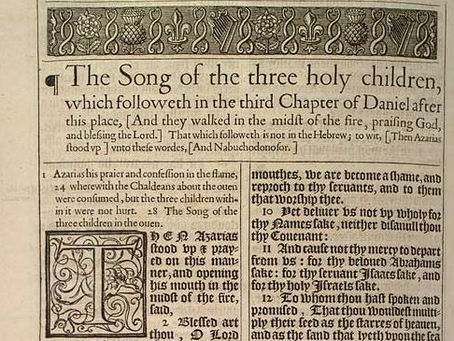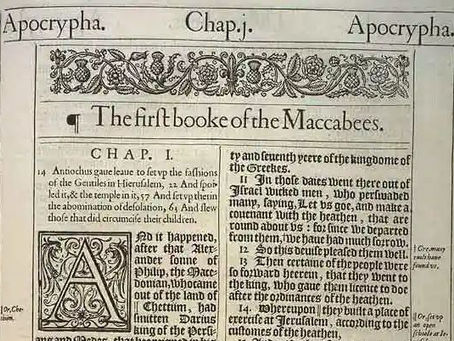top of page


The Book of Enoch: Ancient Vision or Inspired Scripture?
The Book of Enoch: Ancient Vision or Inspired Scripture? The “Book of Enoch” is one of the most famous writings outside the Bible. It fascinates because Jude quotes it directly, some early Christians admired it, and yet it’s absent from nearly every Bible except the Ethiopian Orthodox canon. What is it? Why was it written? And why is it not considered Scripture by most of the Church?
4 min read


The Myth of the “Intertestamental Period”
The Myth of the “Intertestamental Period”. Many Protestant Bibles speak of the “Intertestamental Period” or “400 years of silence.” This phrase refers to the time between Malachi (as arranged in the Protestant canon) and the New Testament. The idea is that God gave no prophetic word during those centuries, leaving Israel in silence until John the Baptist arrived.
3 min read


Bel and the Dragon: God Exposes False Gods
Bel and the Dragon: God Exposes False Gods. Bel and the Dragon is one of the lesser-known but most striking narratives in the Bible of the early church. Preserved in the Greek Septuagint (LXX) as part of the Book of Daniel, it tells two stories: the defeat of the idol Bel and the destruction of a dragon worshiped as a god in Babylon.
4 min read


Susanna: Justice, Wisdom, and the God Who Sees
Susanna: Justice, Wisdom, and the God Who Sees. The story of Susanna is one of the most powerful narratives of integrity and justice in the Bible of the early church. A faithful woman is falsely accused of adultery by two corrupt elders who lusted after her. Facing death by false testimony, she cries out to God — and the young prophet Daniel exposes the lies, delivering her from condemnation.
3 min read


The Prayer of Azariah and the Song of the Three Young Men
The Prayer of Azariah and the Song of the Three Young Men. Most readers of Daniel know the story of Shadrach, Meshach, and Abednego in the fiery furnace (Daniel 3). But in the Bible of the Early Church, the story contains more than just their silent faith. It includes a prayer of confession (the Prayer of Azariah) and a hymn of praise (the Song of the Three Young Men).
4 min read


The Letter of Jeremiah: A Warning Against Idols
The Letter of Jeremiah: A Warning Against Idols. The Letter of Jeremiah is a short book that many Protestants have never read because it’s not in most modern Protestant Bibles. Yet it was part of the Bible of the early church, included in the Septuagint and found in early Christian manuscripts right alongside Jeremiah, Lamentations, and Baruch.
4 min read


Baruch: Wisdom and Confession in Exile
Baruch: Wisdom and Confession in Exile. The Book of Baruch is not found in most Protestant Bibles, but it was part of the Bible used by the early church and remains in Catholic and Orthodox Bibles today. It was written as if coming from Baruch, the scribe and companion of Jeremiah, during the time of exile in Babylon.
4 min read


Sirach (Ecclesiasticus): Wisdom Rooted in Covenant
Sirach (Ecclesiasticus): Wisdom Rooted in Covenant. The Book of Sirach—also called Ecclesiasticus or The Wisdom of Jesus Son of Sirach—is one of the great treasures of the Bible of the Early Church. Written around 200–175 BC, it bridges the Hebrew wisdom tradition with the world of the New Testament. For centuries it was considered Scripture by Jews and Christians alike, though most Protestant Bibles now omit it.
4 min read


Wisdom of Solomon Book Summary: A Hidden Key to Christian Theology
Wisdom of Solomon Book Summary: A Hidden Key to Christian Theology. The Wisdom of Solomon (also called The Book of Wisdom) is one of the most theologically rich texts in the Bible of the Early Church. Although it is excluded from most modern Protestant Bibles, this book played a significant role in shaping early Christian thought—especially the writings of Paul and the theology of Jesus as the embodiment of divine wisdom.
4 min read


Maccabees Summary – The Books They Removed That Explain It All
Maccabees Summary – The Books They Removed That Explain It All. The Books of the Maccabees (1–4 Maccabees) are some of the most historically and theologically important writings in the Bible—yet many modern Christians have never read them. These books were included in the Greek Old Testament (Septuagint), the version used by Jesus and the early Church for centuries, and they offer essential context for understanding end-times theology, spiritual endurance, and even the origin
5 min read


Book of Judith Summary – The Woman Who Struck Down a King
Book of Judith Summary – The Woman Who Struck Down a King. Judith is one of the most fascinating and controversial figures in the Bible—and yet many Protestant readers have never heard of her. Why? Because Judith is one of the books included in the Septuagint, the Greek Old Testament used by Jesus, the apostles, and the early Church for nearly two millennia—but later excluded from many modern Protestant Bibles.
4 min read


Book of Tobit Summary: God Sees in the Exile
Book of Tobit Summary: God Sees in the Exile. Tobit is the story of a righteous man blinded in exile, a woman oppressed by grief, and a hidden angel on a mission from God. Set in the Assyrian diaspora after the fall of the northern kingdom of Israel, it follows two parallel paths of suffering that divinely intersect through healing, deliverance, and restoration.
5 min read


The Apocrypha: Lost Books or Forgotten Scripture?
The Apocrypha: Lost Books or Forgotten Scripture? The word “Apocrypha” means hidden in Greek. But in this context, it refers to a group of ancient Jewish writings included in the Greek Old Testament—the Septuagint (LXX)—but later excluded from the Hebrew Masoretic Text. These books are also known as the Deuterocanonical Books (literally, “second canon”), especially in Catholic and Orthodox circles, where they are considered fully inspired Scripture.
5 min read
bottom of page